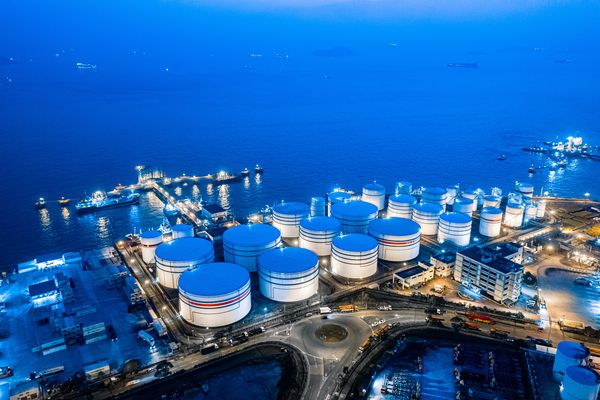America's largest refiner, Phillips 66 (PSX +2.17%), announced its plans to convert its San Francisco Refinery in Rodeo, California, from fuels made from crude oil to fuels made from cooking oil, fats, greases, and soybean oils. Known as Rodeo Renewed, the project is expected to be the world's largest renewable fuels plant when the full conversion is completed in 2024.
Rodeo Renewed signifies a bold push toward sustainability for Phillips 66. If successful, more conversions could follow as the company continues to invest in environmental, social, and governance (ESG) projects. Here's what the project entails and what Phillips 66 expects from Rodeo Renewed.

Image source: Getty Images.
Project details
Rodeo Renewed is expected to produce 800 million gallons per year of renewable diesel, which is a drop-in replacement for petroleum-derived diesel. Renewable diesel's drop-in characteristic means it is a plug-and-play fuel source for any equipment or system that can take diesel, sparing Phillips 66 customers any modifications or additional costs.
According to Phillips 66, the project should lower the plant's greenhouse gas emissions by 50%, which would allow the company to meet its California Low-Carbon Fuel Standards obligations while also reducing the company's overall carbon footprint.
Since going into effect in 2011, the California standards have led to a surge in renewable diesel supply, which was nonexistent in 2011. As of 2018, renewable diesel now supplies California with 400 million gallons per year, which is 10% of the total diesel supply in the state.
The added value of renewable diesel compared to regular diesel is one reason why Phillips 66 believes the conversion can return 30% or more even with a hefty $750 million to $800 million price tag.
Renewable portfolio
Rodeo Renewed is poised to be the crown jewel of Phillips 66's renewables portfolio and more than triple the company's 340 million annual gallons of potential renewable diesel projects.
Aside from Rodeo Renewed, Phillips 66 has invested $8 billion into ESG projects from 2012 to 2019 and was able to reduce key greenhouse emissions by 28% during that time. Its Humber Refinery in the U.K. is an existing example of what Rodeo Renewed and future conversions have the potential to accomplish. At over 50 years old, Humber was a prime candidate for conversion. It now produces renewable diesel and high-grade graphite coke for lithium-ion batteries used in electric vehicles (EVs), and is planning on producing renewable hydrogen as well.
In addition to refinery conversions, Phillips 66 has installed hydrogen fueling stations and hopes to use solar energy to power its pipelines and refineries.
Excellent track record
Phillips 66 has a track record of generating shareholder returns. Since going public in 2012, its shares are up 90% and its dividend has increased 350%. Although Phillips 66 declined to raise its dividend this year, its shares now trade at a 45% discount to where they began the year. With that share decline, its dividend yield is now 6%, about triple the market average.
Refinery conversions will take time, and it could be years before they make a meaningful impact on Phillips 66's bottom line. In the meantime, you can take solace in the fact that Phillips 66 will pay you to wait.
More to come
Rodeo Renewed seems to be a great fit for Phillips 66. Continued interest in ESG investing and alternative fuels at the state and federal levels could open the door for Phillips 66 to convert more refineries down the road. By leaning into the energy transition instead of backing away, Phillips 66 has the opportunity to increase its profitability and lower its carbon footprint. Refinery conversions will take time, and it could be years before they make a meaningful impact on Phillips 66's bottom line. In the meantime, the company sports an impressive 6% dividend yield, and its shares are down 45% year to date.
Phillips 66 is putting the chips on the table with Rodeo Renewed. It's a bold play, but I think it's the right long-term decision for the company. With the shares at a discount, Phillips 66 looks to be an attractive buy right now.





